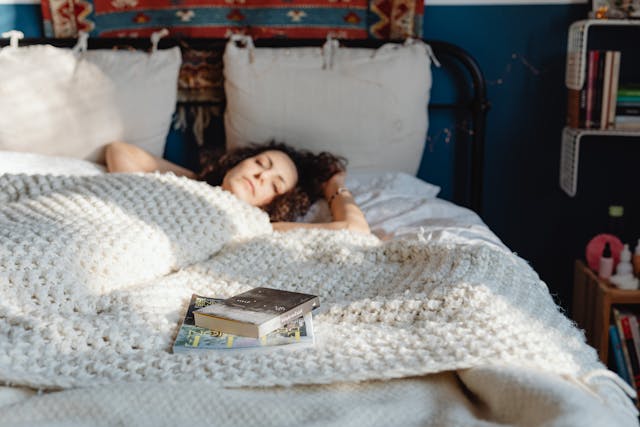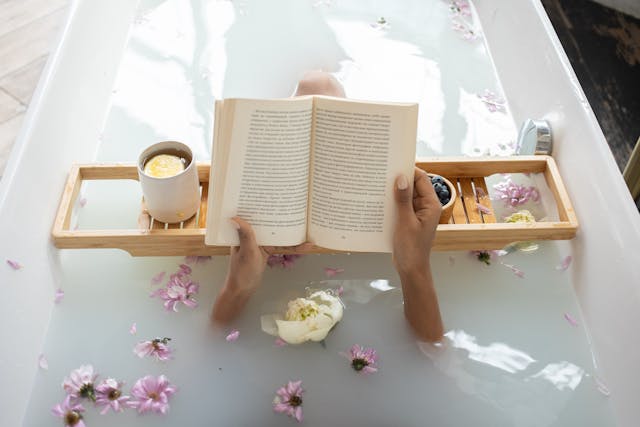We’ve all been there—feeling that pang of guilt after enjoying a little “me time” or skipping a chore in favour of relaxation. But why? We live in a world where self-care is increasingly celebrated, yet many of us still struggle with the weight of unnecessary guilt. It’s time to change that narrative and remind ourselves that some things should never make us feel bad.
What Are We Feeling Guilty About?
From indulging in our favourite treat to saying no to social plans, guilt comes in many forms. The common thread? We’re often putting others first, neglecting our own needs. Here are some things you should absolutely not feel guilty about:
- Taking time for yourself – Whether it’s an hour in the bath or binge-watching your favourite show, self-care isn’t selfish. In fact, it’s essential for mental health.
- Saying no – You’re allowed to say no to plans or obligations if you’re feeling overwhelmed. We can’t be everything to everyone, and protecting your peace should be a priority.
- Eating what you love – There’s no need to feel guilty about indulging in your favourite foods. A balanced approach to eating includes room for enjoyment.
- Resting instead of being productive – Our culture praises busyness, but rest is crucial for recharging your body and mind. You don’t always need to be hustling.
- Spending money on yourself – Treating yourself to something you love, whether it’s a coffee or a vacation, is part of showing yourself care and love.

When Did We Start Embracing Self-Care?
The concept of self-care isn’t new, but it has gained significant traction in recent decades. Self-care, as we know it today, largely grew out of the social justice movements of the 1960s and 1970s. Black feminists like Audre Lorde emphasized self-care as an act of political resistance—especially for marginalized groups who faced systemic inequalities and discrimination. In her words, “Caring for myself is not self-indulgence, it is self-preservation, and that is an act of political warfare.”
While the roots of self-care were about survival and resistance, the concept has evolved in modern times. In the 1980s and 1990s, psychologists began to champion the idea that mental well-being required regular self-care. By the early 2000s, the wellness industry exploded, and self-care became a mainstream topic, with influencers, health gurus, and public figures all jumping on board.

Who Brought Self-Care Into the Spotlight?
Many public figures have contributed to the self-care conversation. Oprah Winfrey has long been a vocal advocate of taking time to nurture the mind and body, frequently discussing wellness and balance in her shows. More recently, pop stars like Beyoncé and mental health advocates like Glennon Doyle have spoken openly about the importance of setting boundaries, resting, and looking after oneself.
The surge of mental health awareness in the media has also helped break down the stigma associated with self-care. People like Michelle Obama and Selena Gomez have shared their personal experiences with burnout and stress, showing that even high-achieving individuals need downtime.
Research into self-care also shows that guilt often blocks true relaxation and health benefits. Studies from psychology suggest that when we accept self-care without guilt, our mental and physical well-being improves, as guilt can trigger cortisol, the stress hormone, undermining the benefits of self-care practices. Letting go of guilt, allows us to embrace life’s richness without the heaviness of self-blame.

Ways to Practice Self-Care
- Unplug from technology – We’re always connected, whether it’s social media, work emails, or endless scrolling. Taking a digital detox, even for a few hours, allows your brain to rest and reconnect with the present moment.
- Move your body – Exercise isn’t just for physical health; it’s a game-changer for mental well-being, too. Whether it’s yoga, walking, dancing, or a quick workout, movement releases those feel-good endorphins and helps reduce stress.
- Meditation and mindfulness – Quieting the mind can do wonders. Spending even five minutes a day in meditation can reduce anxiety, improve focus, and give you a sense of calm.
- Indulge in hobbies – Sometimes we forget the things that bring us joy because life gets in the way. Take up a hobby you love or start a new one—painting, gardening, reading, knitting. Doing something purely for enjoyment is a great way to recharge.
- Journaling – Writing down your thoughts, feelings, or even daily gratitude can help you process emotions and stay grounded. It’s a healthy way to reflect on your inner world.
- Pamper yourself – Self-care can also mean treating yourself to something special, like a long bath, a skincare routine, or a spa day. Taking time to nurture your body is both relaxing and restorative.
- Social self-care – Spending time with people who uplift and support you is just as important as alone time. Have a coffee date with a friend, plan a cosy night in with loved ones, or simply call someone who makes you smile.
- Say no without guilt – Self-care also involves setting boundaries. Learning to say no when you’re stretched too thin is an empowering act that protects your energy and mental well-being.
- Prioritize rest and sleep – Sleep is non-negotiable for both mental and physical health. Make sure you’re getting enough rest and don’t feel guilty for taking naps if your body needs it.
- Eat mindfully – Nourishing your body with food that makes you feel good is a form of self-care. Enjoy balanced meals, but also indulge in your favourite treats without guilt.

Guilt-Free Self-Care: Embrace It!
It’s time to normalize self-care and stop apologizing for doing what’s necessary to maintain mental and physical health. Feeling guilty for prioritizing your well-being serves no one, least of all yourself. Remember, you can’t pour from an empty cup.
The next time you feel bad for saying no to plans, or taking an afternoon nap, pause and remind yourself: self-care is not indulgent, it’s necessary. Take the break, enjoy that treat, and let go of the guilt.
Remember, self-care looks different for everyone. It can be as simple as taking a few deep breaths or as grand as planning a weekend getaway. The most important thing is to do what feels right for you and not feel guilty for taking that time!
Love Life x
References:
(Twenge, J. M., & Campbell, W. K. “Associations between screen time and lower psychological well-being among children and adolescents: Evidence from a population-based study.” Preventive Medicine Reports, 2018.)
(Biddle, S. J. H., & Asare, M. “Physical activity and mental health in children and adolescents: A review of reviews.” British Journal of Sports Medicine, 2011.)
(Goyal, M. et al. “Meditation Programs for Psychological Stress and Well-being: A Systematic Review and Meta-analysis.” JAMA Internal Medicine, 2014.)
(Kuykendall, L., Boemermann, H., & Zhu, Z. “The importance of leisure for subjective well-being.” Journal of Positive Psychology, 2018.)
(Holt-Lunstad, J., Smith, T. B., & Layton, J. B. “Social relationships and mortality risk: A meta-analytic review.” PLoS Medicine, 2010.)
(Walker, M. P. “The role of sleep in cognition and emotion.” Annals of the New York Academy of Sciences, 2009.)

